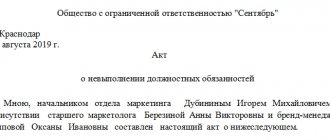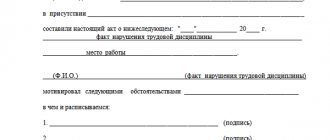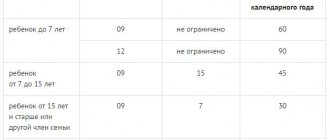The concept of violation of sick leave regime
A violation of the regime is considered to be any deviation by the patient from the norms prescribed by medical institutions - reluctance to perform prescribed actions, rude behavior towards medical staff, drinking alcohol or appearing at an appointment while drunk. The entire list is presented in Article 255 of the Federal Law.
Violation of the regime on the sick leave is classified according to the following codes:
- No. 23 – actions that relate to violation of the regime.
- No. 24 – failure to show up to the doctor on time.
- No. 25 – unauthorized appearance at work without doctor’s orders.
- No. 26 – refusal to conduct additional examination or examination.
- No. 27 – violation of the deadline for appearing for an examination or examination.
- No. 28 – other non-compliance.
One of the specified codes is entered on the certificate of incapacity for work when any non-compliance is recorded.
Read about the nuances of violating the sick leave regime and how code 24 is paid in the article:
What constitutes a violation of the regime
When an employee is injured or falls ill, he is obliged to go to a medical institution, where a specialist examines him and makes a diagnosis, or a series of additional tests are prescribed to determine the exact disease and subsequent treatment for it. It doesn’t matter whether a citizen goes to a free clinic or a paid private institution, the main thing is that the institution has a certificate for the legal issuance of sick leave.
After the diagnosis is established by the doctor, appropriate treatment is prescribed and a temporary disability certificate is issued, on the basis of which benefits will be calculated for the patient. The main condition of payment is the need to follow the regimen prescribed by the specialist and take prescribed medications. All this determines the patient’s regimen. If a citizen violates a doctor’s instructions, this may be a good reason to reduce the amount of benefits.
How is sick leave paid for in violation of the schedule in 2021?
If an employee brings a document on temporary disability with a note about deviations, an explanatory note is taken from him. In the explanatory note, the employee is obliged to set out the reasons that prompted him to perform this action. The presence of valid reasons allows payment to be calculated using the usual method. The absence of valid reasons entails the need to make calculations based not on the average salary of the employee, but on the minimum wage established by law.
Calculation of sick leave with violation of the hospital regime
Let's look at specific examples of calculating payment of disability benefits for time spent at home or in the hospital.
Payment according to a document that contains a note about non-compliance with the regime. In this case, the failure to attend the appointment was due to a valid reason.
The document was opened on March 10. The patient did not show up for her scheduled appointment on March 13. I only saw the doctor on March 15th. The document with a violation mark was extended and closed on March 17.
8 days • 1523.13 average salary of an employee • 100%, because her insurance experience is 9 years = 12,185 payable.
Payment according to a document in which non-compliance is noted and there are no valid reasons for them:
When appearing on March 15, the document was not renewed. Only four days are taken from 10.03 to 13.03, the rest of the time is not subject to payment.
4 • 1523.13 = 6,092.52 rubles payable.
Upon appearance on March 15, the document was extended until March 17. Four days are paid according to the previously proposed scheme. The remaining four days are paid based on the minimum wage established in 2021 – 9489 rubles.
- 4 • 1523,13 = 6 092,52
- 4 • (9489:31) =1224.38
In total we get 6,092.52 +1224.38 =7316.9 rubles for the final payment.
What is included in the changes?
- The first change concerns the payment of sick leave - payments will be made from the Social Insurance Fund. Employers no longer pay sick leave in full.
- The second change concerns the calculation procedure. The calculation period is taken as two calendar years preceding the employee’s temporary disability. The entire accrued salary amount for the specified period is divided into 730 calendar days.
- The third change affected the length of service required to calculate payments. According to the plan, the increase will occur in stages over the next twelve years (until 2028).
Persons into whose personal accounts in the Pension Fund insurance contributions have been paid for eight or more years will receive 100% of the average salary.
If the insurance period for sick leave is from five to eight years, payments will be 80%. The minimum amount of payments for insured employees with relatively short experience of up to five years is an amount of 60%.
For citizens who do not have a permanent job, calculations are based on the minimum wage established by the government for the current year. The same calculation rule applies to employees with less than six months of experience, and persons with monthly earnings below the minimum wage.
What are the consequences of violating sick leave?
The consequences of violating the sick leave regime directly depend on both the non-compliance itself, which is reflected by a certain code in the document, and the explanation of the reasons for the action and its documentary evidence. The most common consequence is the legal right of the employer to reduce sick pay, calculating it based on the minimum wage. In some cases, from the moment of recorded non-compliance, payment may be completely refused. The employer also has the right to designate these days as days of absenteeism or register them for the employee as days at his own expense. In both cases, acts and protocols are drawn up and the corresponding order is issued.
Recognition of the reasons for violating the rules as valid
In certain situations, no sanctions are applied to a patient who has violated the hospital regime.
This is usually explained by the presence of valid reasons for the violation on the employee's ballot.
The list of reasons is not fixed at the legislative level, however, as practice shows, the commission is always guided by the same generally accepted norms.
Usually the following reasons are considered valid:
- extraordinary and unavoidable circumstances (natural disasters, terrorist attacks, etc.);
- change of place of residence (moving to another city or another country);
- the presence of a serious illness in a close relative or his death.
For your information. The law does not oblige the employer to rely on this list when determining whether a violation is valid.
When is the explanatory note drawn up?
An explanatory note is drawn up by each employee who wants to prove the fact that the reasons for violating the hospital regime are valid. It is written immediately after the convening of a special commission to consider the case and submitted to its representative. The document must contain the following details:
- who is the recipient of the explanatory note (the head of the organization in which the author works);
- name of the enterprise;
- who is the author of the explanatory note and what position he holds;
- information about the reasons for which the employee receives temporary disability benefits;
- exactly how the hospital regime was violated and when;
- what are the valid reasons for not reducing the benefit;
- a list of documents that are attached as evidence of the mentioned valid reasons.
- explanatory note about violation of the sick leave regime
- explanatory note about violation of the sick leave regime
All the documents mentioned above must be submitted along with the explanatory note.
In what case is the act filled out?
A report on violation of sick leave is drawn up whenever the relevant case is considered by a special commission.
The commission is also involved in filling out this document. It indicates all the circumstances of the violation, indicating good or bad reasons.
This paper is necessary so that the employer has grounds to reduce benefits or the employee himself can prove his innocence.
- act of violation of hospital regulations
- act of violation of hospital regulations
Creation of a commission
Reference. The commission, which makes a decision regarding the validity or otherwise of reasons, is recruited from company employees and/or social insurance specialists, as well as representatives of trade unions at a general meeting of the workforce.
The procedure for its creation was approved by clause 11 of the Regulations, approved. Government Decree No. 101 dated 12.02.94. In addition, all functions and rights of the commission are spelled out in the normative act “Model regulations on the commission (authorized) for social insurance” (approved by the Federal Social Insurance Fund of the Russian Federation on July 15, 1994 N 556a).
During the consideration of the case, members of the commission may consult with representatives of the medical institution and any other witnesses whose testimony seems important. The verdict is drawn up in the form of a protocol.
What should an employer do when registering a ballot if there were good reasons?
If the commission found the reason for violating sick leave to be valid, the employer must pay benefits to the employee in full. The order for calculating benefits in this case is almost no different from the standard one, however, it additionally indicates the fact that the reason for violating the sick leave was recognized as valid.
How is an order drawn up for unjust cause?
If the reason was found to be unjustified, the order specifies the amount that should have been accrued as part of the benefit initially, the violation code, the date of the violation, as well as the total amount of funds that were withheld (more about what consequences are expected at work if the sick leave regime is violated , we talked about in a separate article).
- order for violation of hospital regulations
- order for violation of hospital regulations
Causes of violations and codes
If the patient violates the regimen prescribed to him, then he will be required to provide an explanation in writing indicating a justified reason for the violation. The amount of the benefit will depend on whether the reason was valid or not.
Since the legislation does not contain a specific list of valid reasons for violating hospital regulations, in this case you can be guided by. In accordance with this document, valid reasons mean:
- Force majeure is various kinds of emergency situations (accidents, natural disasters, etc.) that did not allow the patient to comply with the instructions.
- Long-term disability - if a patient is on sick leave for more than six months, then in some cases he cannot fulfill standard requirements.
- Moving to another locality - a change of place of residence often does not allow a timely visit to the doctor.
- Illness (injury, death) of close relatives is a situation in which the patient is required to care for a relative.
The employer may be guided by the above regulations, but he does not have such an obligation. If a controversial situation arises between an employee and an employer regarding establishing the reason for violating the hospital regime, then the conflict in such cases can be resolved in court.
If the sick leave was not violated for a good reason, then the amount of benefits will be reduced for such an employee. The reason for the violation is indicated on the sick leave certificate. Each type of violation is assigned a corresponding code (Order of the Ministry of Health and Social Development No. 624n):
- Code “23”—violation of the regimen prescribed to the patient, leaving the medical facility without the doctor’s permission. This type of violation includes the patient’s refusal to take prescribed medications, violation of nutritional rules established in accordance with the disease, etc.
- Code “24” – untimely visit to the doctor. If the violation is associated with a serious deterioration in the patient’s well-being, which prompted a referral to emergency medical services, then such a reason will be considered valid.
- Code “25”—entry to the workplace without discharge from the hospital. Such a mark will be made even if the patient went to the workplace to complete a payment upon dismissal, since such a visit to the employer does not require working a full working day.
- Code “26” - refusal to undergo a medical and social examination. In this case, the certificate of incapacity for work is closed with the date of refusal.
- Code “27” - untimely attendance at a medical institution to undergo a medical and social examination. The sick leave is closed with the date of refusal. Legally, a person cannot be recognized as disabled.
- Code “28” is another type of violation.
If there is no note on any violation on the sick leave sheet, then it is considered that it is closed without violations, and the benefit is paid in full.
Consequences
Is sick leave paid in full if the patient violated the regime and the document contains a mark, for example, code 24?
If the incapacity regime is violated, the benefit paid to the employee must be reduced. In this case, it cannot exceed the minimum wage for a full calendar month. The minimum wage established by Federal Law No. 82-FZ of June 19, 2000 is taken into account, but taking into account the regional coefficients in force at the employee’s main place of work.
The exception is cases where the violation was committed for valid reasons. Then the benefit should be calculated in the usual amount. The list of such reasons was approved by order of the Ministry of Health and Social Development of Russia dated January 31, 2007 No. 74. These, in particular, include:
- force majeure, that is, extraordinary circumstances;
- illness or injury resulting in long-term temporary disability lasting more than six months;
- moving to another area, due to which visiting a medical institution becomes impossible;
- damage to health or death of a close relative.
Other reasons can be recognized as valid only by a court decision.
An employee who violates the rules is required to give an explanation and provide documents confirming his compliance. Issues of recognizing a reason as valid or disrespectful can only be considered by the social insurance commission created by the employer, formed from among the administration of the business entity and the workforce.
We talked more about what consequences can be expected at work if sick leave is violated in a separate article.
Violation of the regime for a good reason
Violations for an objectively justifiable reason will not affect the amount of sick leave benefits.
For example, if a patient was unable to come to a doctor’s appointment on time because he felt unwell (he will have to call an ambulance to confirm), he was prevented by natural conditions, his relative was injured or his relative died, he will receive a payment in full.
Payment for sick leave with violation of the regime for a good reason is made in full.
Reasons caused by natural disasters, emergencies, long-term illness (more than six months) or the patient moving to another region will also be valid.
To secure a violation of the “for good reason” status, the entrepreneur must send a letter to the accounting department regarding the payment of full benefits based on the employee’s explanatory note.
Hospital mode
Sick leave and temporary disability are not vacation. The employee is undergoing treatment, the first priority is restoring his functionality. Therefore, sick leave and compliance with the regime are regulated by many rules. First of all, to ensure timely recovery and control over this process.
Hospital regime is a set of rules and protocols that must be followed during recovery, called hospital regime. They can be either purely medical or related more to accounting and calculation of benefits.
According to medical criteria, hospital treatment can be divided into four types:
Strict bed rest is prescribed for the most complex diseases, for example, after major operations. The patient must maintain a constant position in bed, completely prohibited from moving or even getting up;
Bed - the patient is allowed to move independently in bed. But he is strictly forbidden to get up or sit down, in other words, to leave the bed. The regimen is prescribed after injuries, surgeries, and some other medical procedures;
Semi-bed resting - the patient must remain in bed for most of the day, but is already allowed to independently visit the toilet and take a sitting position to eat. Widely used after simple operations;
General is the most gentle mode. The patient can walk, lie and sit
There are quite a few restrictions, but you should still pay attention to your well-being and not overexert yourself. The regimen is prescribed for not very serious diseases or for almost complete absence of consequences from medical procedures.
In addition to medical rules, there are mostly technical regulations regarding timely attendance at doctor's appointments and going to work without being discharged. Below we will also look at the consequences of violating such rules.
Documentary recording of the violation
Many managers are interested in the question of how to pay for sick leave in violation of the rules so that in the future there will be no problems with the labor inspectorate and judicial authorities.
A very effective measure is the creation of a collegial commission designed to determine the degree of guilt of the employee. Typically, it includes department heads and trade union representatives. But both the individual decision of the manager and the collegial commission can be appealed in court. Another legally correct measure for recording the fact of an offense is drawing up an act.
It must include:
- code for non-compliance with the prescribed regimen;
- a brief explanation of the reasons for the violation;
- a summary of the employee’s explanatory note (if available);
- information about the commission (name and position of all its members);
- information about witnesses to the fact of the offense (usually the specialist who observed the employee);
- the decision made on the issue (to pay the benefit in full, in part or withhold 100% of the amount);
- date of drawing up the act with signatures of all commission members.
Drawing up such a document will avoid challenging the decisions of management and the commission in the labor inspectorate and will eliminate possible questions from the social insurance fund.
What does code 36 on a sick leave mean?
Nefedov did not come on the day appointed by the doctor, January 16, but appeared on January 18. The sick leave certificate contains code 24. The commission found the reason for non-appearance to be unjustified.
Important: Guardian – 10 years. We calculate the allowance:
- From January 11 to January 15, we count as usual:
Nefedov’s income amounted to 548,000 rubles in 2021, and 616,000 rubles in 2021. Billing period – 2016-2017, 730 days. Number of sick days – 5.
We calculate the average daily earnings: (548000+616000) / 730 = 1594.52 rubles. More than 10 years of experience, we take 100% of average earnings. We calculate the benefit for 5 days: 1594.52 * 5 = 7972.60 rubles.
- From January 16 to January 28, we calculate based on the minimum wage:
In 2021, the minimum wage is 9489 rubles, average daily earnings: 9489 * 24 / 730 = 311.97 rubles.
Benefit for 8 days: 311.97 * 8 = 2495.76 rubles.
- We calculate the total benefit amount:
7972.60 + 2495.76 = 10468.36 rubles.
Results
Violation of sick leave entails recalculation of benefits not according to average earnings, but according to the minimum wage.
If an employee violated the regime in favor of the employer, for example, went to work on sick days, the violation remains a violation. To avoid problems with the Social Insurance Fund, it is better to recalculate the benefit. And in order to maintain a good relationship with the responsible employee, you can find a way to compensate him for lost benefits and provide additional incentives. You can find more complete information on the topic in ConsultantPlus. Free trial access to the system for 2 days.









